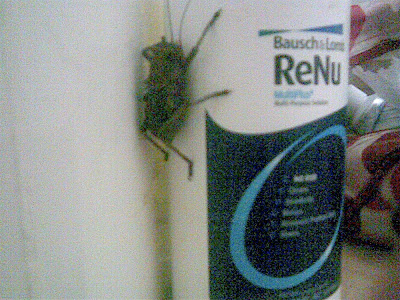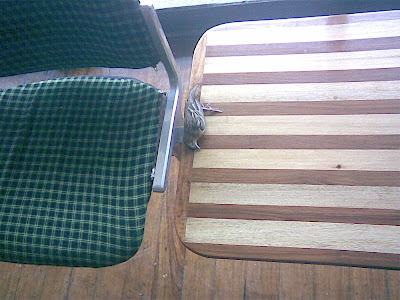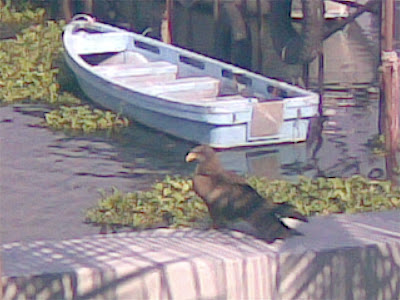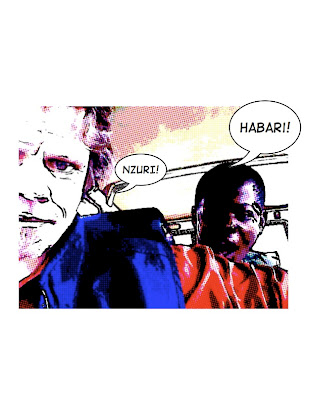So I set up a computer backup in Dar for TCRS and it took about a week, It's not complicated to do that kind of stuff, but it's not easy. It's not cheap, but if it is cheap, it's sketchy.
They have these deep ditches where run off and garbage collect. I see kids in there with nets catching minnows and also somewhat larger, dollar sized fish.

Ann called me In Dar and mentioned that she went running, and when the usual 20 kids were running behind her, she felt something in her shoe. She thought it was one of those plastic seals from a water bottle so she took her shoe off and this bug (I took a picture of it in the bathroom before leaving) drop out. Still alive:

After Dar, the trip to Kibondo consisted of a flight to Kili Airport, 2 hours layover, ad a flight to Mwanza, followed by a 6 hour ride to Kibondo.
At Kilimanjaro International Airport, I had a 2 hour layover. Ended up hanging in the departure lounge. The first thing I noticed was this poor little bird on one of the end tables.

I was at the airport there in Kili, and I sat down in the departure lounge, such as it is, and noticed immediately two things. 1) Only I and one other person (the guy I sat next to) were sitting in the departure lounge. 2) there were dead birds along the windows. At least ten. I just said aloud, "What's with the dead birds?" the guy next to me, a german who had just climbed kili says"Welcome to Africa".
The way the airport is set up is that here in the lounge, the ceiling is open in the middle, with some traditional looking straw roofing edging the square hole in the middle. But the glass of the lounge is facing the tarmac of the airstrip. So you end up having a ton of flies moving down the chimney of the hole in the middle to score food particles from the humans waiting to fly. These flies then apparently forget how they got in and spend the rest of their short, full bellied lives, banging into the giant windows that offer such a resplendant view of the mountain and the planes TAKING off in front of it. Then the birds come down the chimney and bang into the glass at full speed, maybe trying to get the flies.
From KIA it was to Mwanza, the last part of my flying journey back to Kibondo. It was a car from Mwanza on. I got a picture of this eagle with my cell:

Mwanza is a pretty big city, but until now I've only ever seen the Tilapia and the road to the airport. At the Tilapia, you get a lot of mining folk, because the Gaeta gold mine is a couple hours away. When they are talking about the environment, they are talking about changing it. I'm sitting in the restaurant hearing these South African accents and thinking about how Leul mentioned that they used to pay some of the miners in opium, and how these guys would end up injured or something but die from withdrawal in the hospital. Or the mine would close down and they'd become criminals, junkies looking for a fix. I don't think that is the case with the Gold mine near here, Gaeta, but when I get around mining talk, that's the kind of stuff that pops into my head. It is hypocritical of me to have this negative feeling about mining, since I enjoy the fruits and would suffer without them. I assume an air of affront, magically mitigating my part in exploiting the environment and adding to humanity's suffering.
The car sent to take me back to Kibondo had some errands to do, but picked me up promptly at 8:30. Then I sat in the car for about four hours as we picked up various things in Mwanza. I bought this cool knife for 3,000 shillings:
One other passenger was a little girl named Salome. She helped me learn a little swahili and I made a comic:

At one point on the road, we followed this container truck for about 50km and this guy was hanging from it, catching a free ride. It was a little scary to be too close to him, because if he fell off (I saw his feet slip a couple times) he'd be hard to avoid. He made it, though.

On the drive back from Mwanza to Kibondo, I mostly slept as we cruised for 6 hours or so. Many towns have a "barricade" at the entrance, usually consisting of a long wooden pole precariously balanced on a couple forked sticks in the ground. The car rolls up, and a kid in a uniform comes up and maybe walks around the car, maybe makes the driver sign something, ad then slides the pole out of the way and motions the car onward. We came into one town and the barricade was askew, so the driver kind of slowed down, and muttered something about "no police" or something, and then we rolled through town. After about 50 meters, I see this guy with an orange vest on, in the middle of the road, waving us to the side. I'm thinking, "oh, here's the cop," but the drivers says something like "this guy!" and swerves around him. Only then do I notice that the guy is barefoot, has no shirt on under his vest, is wearing cut off jeans with the fly open and has a ruined grin and crazy eyes.
THere are these storks, called Maribou, that get to be 4 or 5 feet tall. They eat anything, and sometimes you see them around dumps and places that smell bad. So we are still rolling through this town and this guy with a big nose and a trench coat comes strolling out of the crowd of villagers to the side, right into the road in front of us. The driver honks, and the guy starts running ahead of our car and then spreads his wings and takes off. It was a Maribou, but they are so similar in proportion to people that my eyes tricked me at first.
So, back in Kibondo.
kibondo mump